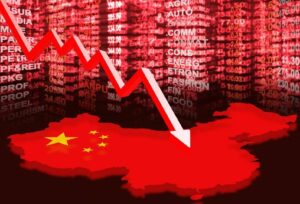
International rating agencies S&P Global and Fitch have downgraded their outlooks for China’s residential real estate market.
real estate, despite Beijing’s announced package of measures to support it.
S&P forecasts a 15% decline in housing sales in China this year, while earlier it expected a 5% decline. According to the agency’s forecast, published on Thursday, the volume of sales of residential real estate in the country will total less than 10 trillion yuan ($1.4 trillion) this year, about half the peak level recorded in 2021.
Fitch this week also worsened its forecast for home sales in the PRC: the agency now expects sales to fall by 15-20% this year, rather than the 5-10% previously estimated.
The lowered forecasts show that rating agencies are not confident in the success of a large-scale package of market support measures, the launch of which the Chinese authorities announced in May. In particular, it includes the abolition of the lower limit on mortgage rates, as well as lowering down payment requirements for real estate buyers using mortgages. In addition, Beijing urged authorities in cities with a surplus stock of ready-made houses to buy back properties at reasonable prices for later use as affordable housing.
Prices of new buildings in China’s major cities fell for the 11th straight month in May. According to a report by China’s State Statistics Office (SSO), the cost of new housing in the country’s 70 largest cities fell 3.9% year-on-year last month, the most since June 2015.
Real estate accounts for about 78% of Chinese residents’ wealth, Bloomberg notes.

The Business Activity Outlook Index (BAOI) calculated by the National Bank of Ukraine (NBU) grew by 9.6 points in June, to 45.5 points, which is lower than the neutral index reading of about 50 and means that pessimistic expectations of business prevail, the regulator said on its website on Wednesday.
“Ukrainian business is gradually recovering from the blow that the coronavirus crisis inflicted on it. The NBU poll indicates that the mood of entrepreneurs in June improved. Economic activity gradually recovered, both in Ukraine and abroad, after quarantine restrictions were eased,” the NBU said.
According to the regulator, the new wave of quarantine easing contributed to economic activity of retail companies – the diffuse index (DI) grew to 50.5 points from 37.6 in May.
The service sector also showed better expectations: DI grew by 12.3 percentage points, to 40.8.
Expectations of industrial enterprises, which DI grew from 40.4 to 49.2, also improved.
Construction enterprise expect the worsening of its activities: DI in June fell by 4.1 pp, to 36 points.
Employment assessments of all sectors retain pessimistic.

Moody’s Investors Service on November 22 changed the outlook on the Government of Ukraine’s ratings to positive from stable. At the same time, Ukraine’s long-term issuer and senior unsecured ratings have been affirmed at Caa1.
“The affirmation of Ukraine’s Caa1 ratings reflects its – while showing signs of improvement – significant external vulnerability,” Moody’s said.
The sizeable external debt repayments due over the coming years would – in the absence of a new International Monetary Fund (IMF) programme – require continued market access. At the same time, the risk of a new flare-up in geopolitical tensions continues to constrain upward movement in the credit rating at this time.
The key drivers for the change in the outlook to positive are: the rebuilding of Ukraine’s foreign exchange reserves is reducing external vulnerability in the context of large external repayments; and the improvement of Ukraine’s macroeconomic stability and the prospect for renewed reform momentum is strengthening the country’s economic resilience.
Concurrently, Moody’s has affirmed the Ca rating on the $3 billion eurobond that Ukraine sold in December 2013. The sole subscriber of the notes was the Russian government. The bond is under dispute due to the international armed conflict between the two governments.
Finally, Ukraine’s long-term foreign currency bond and deposit ceilings remain unchanged at B3 and Caa2 respectively, while the short-term foreign currency ceilings for bonds and deposits remain Not Prime (NP). The country ceilings for local currency bonds and deposits are also unchanged at B3.

The Business Activity Outlook Index (BAOI) with a BAOI reading above the neutral level of 50 implying a positive business outlook and below the neutral level implying a negative business outlook compared with the previous month grew by 2.1 points in September, to 56.6, the National Bank of Ukraine (NBU) said on Wednesday. “In September, all sectors approved the results of economic activity. Enterprises also expected growth in new orders, cost of contractor services and purchase prices. Companies that provide services were optimistic,” the NBU said in the study.
According to the results of the survey in September, the companies that provide services and industrial enterprises are the most optimistic, for which the index was 57.3 and 58.1 respectively.
According to the report, the largest increase in BAOI was seen in the construction sector – by 7.6 points (to 56.2), thanks to a significant increase in the optimistic expectations of enterprises regarding product prices, the emergence of expectations about the volume of purchases of raw materials and optimistic attitude about the increase in the number of employees in the field.
Along with the general increase in BAOI, the indicator fell by 1 point (to 54.5) in the field of trade. According to the results of the study, despite high estimates of trade turnover, expectations about the goods stocks remain pessimistic.